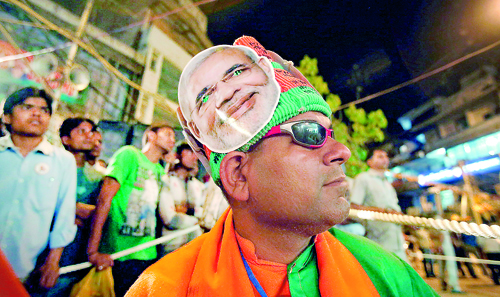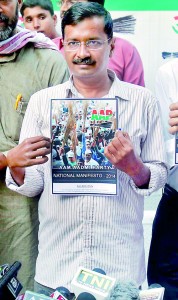Sunday Times 2
India’s polls: Corporations under scrutiny
Arvind Kejriwal, India’s most famous anti-corruption crusader, shook Indian politics in December last year when his one-year-old party, Aam Aadmi Party, wrested a surprising victory in Delhi state assembly polls.
He shook it again in February, when two days before his short-lived run as chief minister ended, he ordered a criminal case against Mukesh Ambani, the chairperson of Reliance Industries Limited, the country’s biggest conglomerate, Veerappa Moily, the country’s petroleum minister, Murli Deora, the former petroleum minister, and VK Sibal, a former bureaucrat.
The case was based on complaints that Reliance and representatives of the federal government had colluded to double the price of gas drilled from an offshore basin, allowing the company to make windfall gains at the cost of consumers and the general public. Reliance has denied the charges, and so has Moily.

A supporter of India's main opposition Bharatiya Janata Party (BJP) wears a headgear carrying a portrait of Hindu nationalist Narendra Modi, prime ministerial candidate for BJP during an election meeting . REUTERS/
Independent experts, however, have raised serious questions on the gas price hike.
Not just the poor, even most educated middle class Indians discovered the gas pricing controversy through Kejriwal, since most Indian media outlets, both print and TV, had not cared to report on it in the past.
But Kejriwal had wider ambitions in attacking Ambani, India’s richest man, than simply raising public awareness on the issue. His fledgling party has fielded candidates for the forthcoming national polls and needs a strong positioning that could resonate across the country.
“Would 2014 election be fought between the Aam Aadmi Party and Mukesh Ambani, with Rahul (Gandhi) and (Narendra) Modi being agents of Mukesh Ambani?,” Kejriwal asked on Twitter.
While Rahul Gandhi is the son of Congress president Sonia Gandhi, Narendra Modi is the chief minister of Gujarat and the prime ministerial candidate of the opposition Bharatiya Janata Party (BJP). The political expediency of the attack did not dent its audacity, which even Kejriwal’s critics found worthy of praise. Hartosh Singh Bal, the political editor of the Caravan magazine, said on Twitter, “must thank Kejriwal for bringing Ambanis into the national conversation…”
Money in Indian politics
Not just Ambani, most corporate czars in India are spared the public spotlight, unless it is a soft one. Post-liberalisation, the country’s media came to project industrialists as inspirational creators of wealth, heaping on them laudatory coverage, with a near absence of scrutiny of the ways in which they were making their wealth.
Simultaneously, the influence of money in Indian politics rose, along with the number of industrialists in parliament, interlocking politics and business in unprecedented ways. The emerging crony capitalism went unexamined, until 2010 when a dip in the economy and the resultant gloom among the middle class coincided with the publication of a report by the national auditor.
In what came to be known as the 2G scam, the auditor held the government guilty of selling the country short by giving mobile spectrum to private companies without any competitive bidding. It was followed by what was termed ‘Coalgate’ by the media: another report by the auditor on how allocation of coal reserves without auctions may have caused the national exchequer losses amounting to $33bn. Both 2G and Coalgate were vigorously reported by the media – but only after the auditor’s findings became available. Through the years when mobile spectrum and natural resources were being doled out to private companies, journalists heard about the arbitrariness and the rent-seeking, but few raised a stink.

Aam Aadmi (Common Man) Party (AAP) chief Arvind Kejriwal shows the party's manifesto ahead of the general election. India, the world's largest democracy, will hold its general election in nine stages staggered between tomorrow and May 12. REUTERS
The glaring absence of hard-nosed journalism in India came into sharp focus when a tranche of audio tapes surfaced, which featured the conversations of a corporate lobbyist Nira Radia.
In the conversations, a prominent editor could be heard discussing story angles favourable to her clients. One of Radia’s clients, Ambani, could be heard boasting that Congress, the ruling party, was his “dukaan” (shop). The lobbyist herself could be heard trying to influence the appointment of the telecom minister. As it turned out, the telecom minister, A Raja, appointed through such corporate manoeuvring, was subsequently jailed for more than a year for his role in the 2G scam. While the auditor’s reports were widely reported in the media, the Radia tapes, as the conversations came to be called, did not make it beyond two English-language newsmagazines.
Threat to freedom of speech
India often erupts with freedom of speech controversies, involving fringe groups seeking to curb the distribution of books and films that presumably offend their sentiments. But there is little public outcry over the routine stifling of stories involving corporates.
For every story of corporate misdemeanors broken by the media, there are several others that die a quiet death. Recently, the media have been reporting the case of Subrata Roy, an influential billionaire with powerful political connections, who was sent to jail by India’s Supreme Court. Roy’s Sahara group stands accused of concocting investors and making illegal investments.
Before the court intervened, few media outlets wrote about the mounting evidence against the group.
In a recent column in Indian Express newspaper, Pratap Bhanu Mehta, the president of the Centre for Policy Research, a Delhi-based think tank, underlined the silence in the Indian establishment.
“While we protest Penguin withdrawing Wendy Doniger’s book as an assault on free speech, let us not forget that it is impossible to publish on companies in India,” he wrote.
Calling the dense network of elites across politics, business and media in India a “plutocracy”, Mehta claimed it had given rise to a politics of excess, to which the Aam Aadmi Party was a “reaction”.
Indeed, for most common people in India, the greatest draw to the Aam Aadmi Party was the promise of probity in public life.
Speaking truth to power
The Aam Aadmi Party can be faulted for giving precedence to political theatre over substantive policy thinking. While this may have alienated some supporters, it has still ended up emboldening ordinary Indians to speak truth to power by asking questions, which might not be a bad thing at a time when the country seems poised to be led by a man who is not known to like them.
Modi remains controversial not just for the anti-Muslim riots that took place under his watch in 2002, but also for the silencing of dissent in his state. He is believed to have exercised such tight control over the state’s media that stories challenging his narrative of running an efficient, corruption-free government in Gujarat never came to light.
Recently, two newsmagazines, Outlook and Forbes, have published stories that investigate the business empire of Gautam Adani, a Gujarat-based tycoon who has had a meteoric rise under Modi. But overwhelmingly the national media have shown an uncritical acceptance of Modi’s claims.
On the campaign trail, Kejriwal has consistently attacked the media, accusing it of being sold out to Modi and his corporate backers. The accusation itself might have elicited some sympathy among journalists, who are concerned over the influence of money on the media, but Kejriwal went one step further, threatening to jail journalists if his government came to power.
“Kejriwal should know that any paid news out there is thanks to media barons and not journalists,” the former editor of The Hindu, Siddharth Varadarajan wrote on Twitter.
Many have mocked the irony of Kejriwal accusing the media of bias, given that he was catapulted to national prominence in the space of a few weeks in 2011 largely because of the intense and favourable media coverage of the anti-corruption movement he led.
But few know that the movement’s social media campaign was led by a technology tycoon, Rajesh Jain, who has been a long-time supporter of the BJP, and is now leading the online campaign of Modi.
Courtesy al Jazeera


